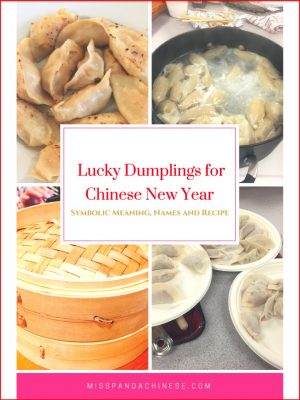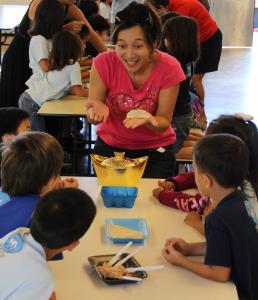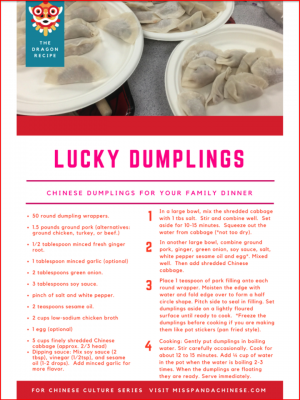Lucky Dumplings for Chinese New Year! Yes! I hope you can these delicious dumplings at home and enjoy them during the Lunar New Year celebration.
Making dumplings for the Spring Festival, a.k.a. Lunar New Year or Chinese New Year is a popular tradition in Chinese families who are from the Nothern part of China. There can be a day dedicated to making the lucky dumplings with all the family members or even with the relatives.
It can look like an assembly line with waves of laughter and chitchat.
My grandmother had a couple of special big silver coins that she saved and used only when we were making dumplings for the Chinese New Year.
Do you know what she used them for?
You might also want to know why making these little dumplings is such a family affair.
For me, cooking is an expression of the land where you are and the culture of that place.
-Wolfgang Puck
Symbolic Meaning
Dumplings are the number one lucky dish Chinese people eat for Chinese Lunar New Year.
Dumplings are generally called “Shuǐ jiǎo 水餃 | 水饺.” It literally means water dumplings, that is the indication of its cooking style.
These dumplings are cooked in the boiling water. They roll and tumble in the hot water for about 10 minutes or so and they are ready to be served.
Dip them in your favorite soy sauce with sesame oil and enjoy!
But these dumplings have a royal name during the Chinese New Year!
They are now called “yuán bǎo 元寶|元宝.” Yuán Bǎo were the currency in Ancient China and it represented wealth.
See the picture below, you see an enlarged gold ingot shaped candy container on the table and a freshly made dumpling I am holding in my hand.
Do they look alike?
Chinese people think the shape of a dumpling resembles the gold ingot in Ancient China. Therefore, you hear Chinese people say “eat gold ingots – chī yuán bǎo 吃元寶|吃元宝” when they are having the boiled dumplings during the Spring Festival.
Having dumplings during Lunar New Year is for good luck and to bring wealth to the family.
Grandma’s Silver Coins
My Grandma had special big silver coins which she only took out for the Chinese Lunar New Year. She always put one in each of the two special lucky dumplings she made.
My grandma cooked these two dumplings separately so she knew exactly where they were on the plate.
“The two people who get them are going to be super lucky.” Grandma said to us, her grandchildren. What I can recall is that we were usually covered in flour because we were all “helping” her making dumplings.
Whoever picked the special dumpling Grandma would say: “Hmmm…just have a small bite…”
When the silver coin showed up from the cooked dumpling all the young cousins were thrilled and excited…
This is such a wonderful memory and I feel that by just thinking about it brings me good luck!!
Names
What picture do you see in your head when you hear people say “dumpling,” “Gyoza,” “jiǎo zi, “or “pot-stickers?”
Once when I was doing a dumpling making presentation I asked this question.
Someone immediately shouted, “They are all the same!”
Are they?
The names of the dumplings indicate their special cooking method. Let’s take a look.
-
Dumplings – jiǎo zi 餃子|饺子 is a common name for dumplings that are cooked in the boiling water.
-
Dumplings – shuǐ jiǎo 水餃|水饺 is another name for the dumplings that are cooked in the boiling water, just like the one above. “shuǐ 水” means water. “jiǎo 餃|饺” is a general name for dumplings.
-
Dumplings in soup – tāng jiǎo 湯餃|汤饺 is a name for dumplings served in soup. “tāng 湯|汤” means soup. I always enjoy “Dumplings served in beef soup” niú ròu tāng jiǎo 牛肉湯餃|牛肉汤饺.” “niú ròu 牛肉|牛肉” is beef, it literally means “cow meat.”
-
Steamed dumplings – zhēng jiǎo 蒸餃|蒸饺 is the ones that are steamed and cooked in a bamboo steamer. “zhēng 蒸” means to steam so it shows its cooking style.
-
Pan-fried dumplings – jīan jiǎo 煎餃|煎饺 is pan-fried dumplings with lightly golden skin. “jīan 煎” means to pan fry or to saute and that is the way these dumplings are prepared.
-
Potstickers – guō tiē 鍋貼|锅贴 is longer and bigger in shape than that of dumplings. “guō 鍋|锅” means pot, pan, or wok. “tiē 貼|贴” means to stick. That is a self-explanatory name. Traditionally, potstickers are cooked on a hot flat surface with some oil first to brown the skin, then with added water to steam cook. The side that sticks to the pan can be crunchy.
Now you see they are different.
When you go to a local Chinese dumpling eatery you will hear people order different kinds of dumplings with the names you just learned above.
Which one is your favorite?
Recipe
After reading all the delicious types of dumplings it is time to give it a try.
Here is a precious recipe from my grandmother, Grandma Panda. It is light, delicious and healthy.
Click on the image below and download the recipe for your dumpling-making event!
You can also try a homemade dumpling wraps recipe for more fun!
Wishing you and your family a healthy and happy New Year!
Make sure you visit previous MulticulturalKidBlogs Chinese New Year series participating blogs below
新年快樂.新年快乐

Welcome to our fourth annual Chinese New Year blog hop! Lunar New Year, more commonly known as Chinese New Year, starts on February 16. It is the beginning of the Year of the Dog, and we have lots of great ideas for celebrating it with kids! Don’t miss our series from last year, 2016 and 2015, and you can find even more on our Chinese New Year Pinterest board:
Participating Blogs
Creative World of Varya on Multicultural Kid Blogs: Earth Dog Year Fun Facts
Bicultural Mama: Chinese Soup Dumplings (Xiǎo Lóng Bāo): What They Are and How to Eat
Crafty Moms Share: The Year of the Dog
Miss Panda Chinese: Lucky Dumplings Symbolic Meaning, Names, and Recipe
Creative World of Varya: Fun Facts About Teaching in China
the gingerbread house: Simple Chinese New Year Lantern Craft for Kids to Make
ChrissyJee.com: Healthy Ways to Celebrate Chinese New Year



So informative and makes me want to eat some dumpling right now!
This is the power of food in culture! I also feel like to have some dumplings now!!
Thank you, Amanda, for all great job you are doing! The article is really great. The tradition to make jiaozi together is absolutely wonderful, I think.
May the new year be prosperous and lucky for you!
Kind wishes from Russia:-)
Natalia, Thank you for your kind words. I always enjoy Pelmeni пельме́ни and they are wonderful Russian version of dumplings. World culture connect us from one side of the world to the other. I am thrilled to know that you enjoy this festival and its tradition. Happy New Year! A healthy and happy new year to you and your family! -Amanda